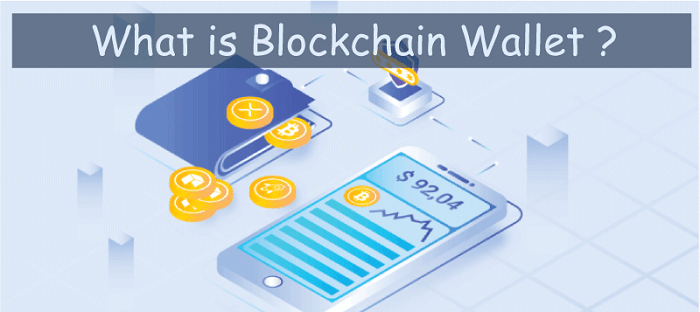What is Blockchain Wallet ?
Blockchain technology has gained tremendous interest in recent years as a safe and dependable means of conducting online transactions. The Blockchain wallet, which functions as a digital wallet for holding cryptocurrency, is a key component of this technology. In this essay, we will define a Blockchain wallet and explain how it works. A Blockchain wallet is a digital wallet that enables users to securely store, transmit, and receive cryptocurrency. It is a software programme that uses Blockchain technology to handle users' private and public keys, allowing them to transact with cryptocurrencies like Bitcoin and Ethereum. The wallet runs on a decentralized network, which means it does not rely on a centralized authority to function, making it extremely safe and transparent. The operation of the wallet is centered on Blockchain technology, which is a distributed ledger system that records all bitcoin transactions. The Blockchain wallet operates by producing a digital signature for each transaction, which protects the transaction's legitimacy and integrity. Before the transaction is posted to the Blockchain, the network nodes verify the signature. The transaction is irreversible once it is recorded on the Blockchain, making the procedure extremely safe. Desktop wallets, mobile wallets, online wallets, and hardware wallets are all examples of Blockchain wallets. Each wallet has its own set of features and perks. Desktop wallets are software apps that are installed on a desktop computer and provide the user complete control over their private keys. Mobile wallets are smartphone applications that allow users to access cryptocurrencies while on the go. Web wallets, which can be accessed via a web browser, allow users to manage their bitcoins online. Hardware wallets, on the other hand, are actual devices that securely store the user's private keys offline. One of the major benefits of Blockchain wallets is their high degree of security. Because the wallet runs on a decentralized network, there is no need for a central authority, making it nearly difficult for hackers to take cryptocurrency from the wallet. Furthermore, the combination of private and public keys guarantees that only the wallet owner has access to the contents of the wallet, adding an extra degree of protection. To elaborate, Blockchain wallets enable users to handle their cryptocurrencies in an intuitive and easy manner. By simplifying the difficult process of bitcoin administration, they give consumers a smooth and hassle-free experience. The wallet's UI is intended to provide a straightforward and simple platform for users to manage their bitcoins. The security of the Blockchain wallet is based on the usage of both public and private keys, which are utilized to authenticate transactions. The private key is a secret code that only the wallet owner knows about and is used to sign transactions. In contrast, the public key is accessible to everyone on the entire network and is used to accept cryptocurrency. Together, these keys maintain transaction security, making it nearly difficult for anybody to take cryptocurrency from the wallet. Blockchain wallets enable transparency in addition to security. All transactions are recorded on the Blockchain, allowing users to easily follow and verify the validity of each transaction. Because of this transparency, there is no need for middlemen such as banks or financial institutions, lowering transaction costs and boosting transaction speed. Another advantage of Blockchain wallets is that they are not geographically constrained. They may be accessible from anywhere in the globe as long as there is an internet connection. This characteristic makes them excellent for performing international transactions since it eliminates the need for costly foreign currency costs. However, it is important to highlight that the security of Blockchain wallets is contingent on the user's adherence to security rules. To prevent unauthorized access to the wallet, users must follow suggested security precautions such as creating a strong password and enabling two-factor authentication. Finally, Blockchain wallets are a game-changing technology that gives a safe and simple way to manage cryptocurrency. They provide high levels of security, transparency, and simplicity, making them suitable for cryptocurrency transactions by people and organizations. While they offer several benefits, it is important to follow prescribed security practices to ensure the protection of cryptocurrencies kept in the wallet. Applications of Blockchain WalletBlockchain wallets offer a variety of uses that make them a valuable resource for consumers and organizations wishing to conduct bitcoin transactions. Blockchain wallets may be used for a variety of purposes, including:
As a result, Blockchain wallets are a handy tool for both people and companies wanting to conduct bitcoin transactions. They have a variety of uses. For online transactions, investments, remittances, and access to decentralized apps, they offer a safe and practical means to store, transmit, and receive bitcoins. It is anticipated that as cryptocurrencies continue to be recognised as a genuine asset class, the use of Blockchain wallets will rise.
Next TopicDemur-rage currencies in Blockchain
|
 For Videos Join Our Youtube Channel: Join Now
For Videos Join Our Youtube Channel: Join Now
Feedback
- Send your Feedback to [email protected]
Help Others, Please Share










